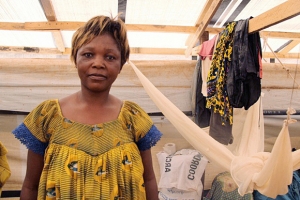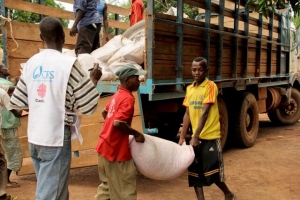
Nathalie Balakadja and her seven children have been living in a displacement camp in Bangui, Central African Republic (CAR), for more than four months. Photo by Kim Pozniak/CRS
“I’m hungry. I don’t have any food.”
I almost didn’t hear the woman’s soft voice as I carefully make my way through the large, white tent housing several displaced families at Centre John 23, a parish compound in Bangui, the capital of the Central African Republic.
I look down from where the voice had come from and see a woman, wearing a yellow dress and flip flops, sitting on a thin and frayed straw mat. A few moments earlier I had noticed the thick mud clumps that were forming under my shoes, the result of a heavy downpour earlier that morning that turned the ground into several inches of thick mud. Nathalie’s mat is spread out on that mud, some of her seven children sitting around her.
I stop to talk to her, listening to her story of how she and her family had arrived here at the parish on Christmas Day 2013. When armed Seleka rebels went door to door in her neighbourhood, accompanied by heavy gunfire, she knew it was time to run. She and her children are now safe at this camp that houses some 1,500 displaced people but they don’t have enough to eat and the moisture from the wet and muddy ground is seeping into their mats and clothes.
Hundreds of thousands of people in CAR have suffered from a conflict that has played out for more than a year. Many outsiders are describing it as religious, but that’s not what I’m hearing here. There are economic and political factors that have pitted communities against each other in horrible acts of violence. And as in so many conflicts, innocent people – women, children, men – are the ones suffering the most.

Caritas is providing food and other aid across CAR. Photo by Kim Pozniak/CRS
Nathalie tells me that her life was good before the conflict. She got along well with others in her community, Christians and Muslims. She used to sell cassava to contribute to the family’s income. Now she lives from the assistance provided by Caritas, with support from confederation members including Catholic Relief Services. She receives rice, sardines and oil, enough to survive. The children spend their days playing with toys crafted from trash and other materials they can salvage but Nathalie wants them to be back in school.
As we speak, I feel a little tug on my sleeve. When I look down, I see one of Nathalie’s children, a little boy no more than five years old. “Do you have anything to eat for me?” he asks in a low voice.
Nathalie’s story is one of thousands of people here in CAR. Muslims and Christians have been forced from their homes, have seen their loved ones killed and their belongings destroyed. They are desperately waiting for security to be established so they can restart their lives.
In the meantime, Nathalie and her children get by with the help of Caritas and the bit of cassava she’s able to sell to others in the camp.
“God gives me strength,” she says, explaining how she’s able face each day with the hope that one of them will be the day that she can return home.
